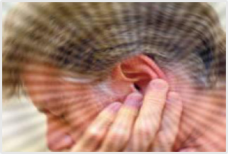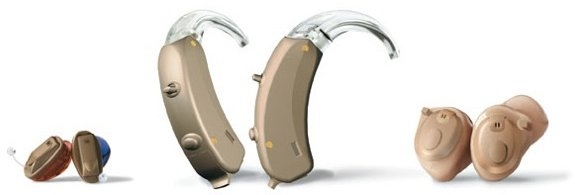Losing your hearing can be quite debilitating and stressful. Not being able to have simple conversations without constant reiteration from your peers can be taxing on self-esteem and social acumen. But don’t fret, there is hope, depending on your level of hearing loss there are clinics in the GTA that can help and treatments readily available at help you overcome hearing loss.

According to
Statistics Canada, 20% of adults aged 19 to 79 had mild hearing loss in at least one ear, with hearing loss more prevalent in older groups. Adults aged 60-79 were 47% more likely to be diagnosed, while adults aged 40-59 were only 16% likely, and ages 19-39 years only 7% likely. Males are considered more at risk for having hearing loss compare to females
[1] . The number one cause of hearing loss is aging. By the year 2036 it is projected that approximately 23.4% of the population, or 4.1 million will be
65 or older [2].
If you have any concerns about your level of hearing, a short hearing test can give you a better idea of how well you can hear. Here is a
link to one such test you can do right now.
Being diagnosed with a hearing disability requires the insight of a
certified audiologist or your family doctor. They will start with a brief physical exam and general screening tests, then graduate to tuning forks, which help differentiate between sensorineural and conductive hear loss. Once evidence of a hearing disability is appreciated, audiometric tests are implemented. These are basically the use of headphones which plays a range of sound tones in each ear to determine your threshold of hearing.
Specialized hearing loss clinics across the GTA are available if you believe your hearing may be impaired; here are some valuable links to find a health care provider near you
- , which have locations across all major cities in Ontario. This s very unique non-profit organization, which is held by directors who have some problems with hearing or deafness. They offer wide range of services: from sign language courses to various signalling devices.
- , which is more GTA oriented. They have very good promotions on hearing devices
- . This is a part of a big research center located in Toronto that is consistently working on cutting edge developments and hearing loss treatments.
- . They have clinic locations in Mississauga, Burlington, Guelph and Oakville. You can book an online appointment for a hearing evaluation.
- , for those who live in Oakville and nearby locations.
Unfortunately there is no cure for sensorineural hearing loss, as the tiny hairs in the inner ear responsible for conducting sound are non-regenerative. This means once they are completely damaged they are gone forever. Modern medicine however has made great strides to help patients suffering from hearing loss to make the most of their communication abilities.

- Hearing Aids - Ideal for mild to moderate hearing loss, they work by amplifying sound waves picked up by a microphone and making them louder for the user to better understand speech. Analog and digital versions are available, but the latter allows tuning of specific frequency ranges that are hard of hearing, albeit at a higher cost.
-
Cochlear Implants - Typically reserved deaf or severe hearing loss patients where hearing aid are ineffective, this option requires a surgical procedure to implant tiny electrodes in the inner ear that directly stimulates the auditory nerve. This is combined with an externally located microphone, and a transmitter embedded under the skin which sends signals directly to the implanted electrodes via a magnetic coupling [3]. Cochlear implants work by replicating different frequencies and amplitudes, and only provide a sense of sound, successfully augmenting hearing to better understand speech and surrounding noises.
-
Bone Anchored Devices - This method also requires a surgical procedure in which a titanium implant is placed in the mastoid bone, and later an external sound processor is attached which sends sound vibrations via bone conduction. These devices are mainly used in patients with conductive or mixed hearing loss which can be a result of chronic ear infections, inner ear malformations, or post vestibular schwannoma surgery (tumor of the balance and hearing nerves).
OHIP will cover the cost of diagnostic hearing tests ordered and performed by a qualified physician. However, hearing tests arranged by a 3rd party such as employers or school boards are NOT covered
[5]. This means that an audiologist has to work with or be referred by a doctor who will bill OHIP. Also as of July 2001, hearing aid evaluations and re-evaluations are no longer covered by OHIP as these services do not require the expertise of a physician. There is however the
Assistive Devices Program, which if eligible will contribute a fixed amount to help Ontario citizens afford hearing-aids.

 According to Statistics Canada, 20% of adults aged 19 to 79 had mild hearing loss in at least one ear, with hearing loss more prevalent in older groups. Adults aged 60-79 were 47% more likely to be diagnosed, while adults aged 40-59 were only 16% likely, and ages 19-39 years only 7% likely. Males are considered more at risk for having hearing loss compare to females [1] . The number one cause of hearing loss is aging. By the year 2036 it is projected that approximately 23.4% of the population, or 4.1 million will be 65 or older [2].
According to Statistics Canada, 20% of adults aged 19 to 79 had mild hearing loss in at least one ear, with hearing loss more prevalent in older groups. Adults aged 60-79 were 47% more likely to be diagnosed, while adults aged 40-59 were only 16% likely, and ages 19-39 years only 7% likely. Males are considered more at risk for having hearing loss compare to females [1] . The number one cause of hearing loss is aging. By the year 2036 it is projected that approximately 23.4% of the population, or 4.1 million will be 65 or older [2].
